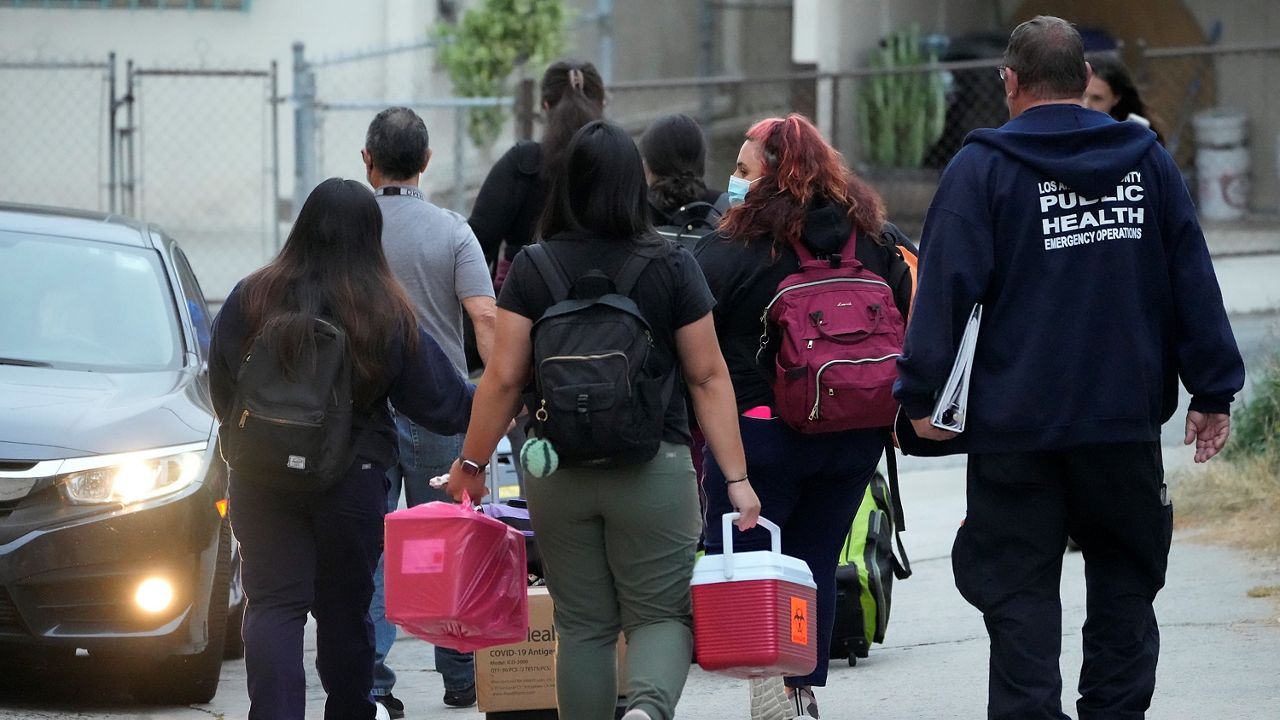WASHINGTON — A key portion of the Biden administration’s immigration policy is a lawsuit away from crumbling. A pending ruling from a federal judge in Texas threatens a humanitarian parole program that allows the U.S. to accept 30,000 immigrants each month from countries considered politically unstable. But relatives of those immigrants who got to enter the country are fighting to save the initiative.
You might know the feeling of eagerly awaiting to greet a loved one arriving at the airport. Anne-Valerie Laveus experienced it earlier this month when she finally embraced her brother and 15-year-old nephew after years of fearing for their lives and trying to get them to safety.
“God made a way out of no way is how I felt,” Laveus, a Florida educator, told Spectrum News. “It was the most freeing moment in a very long time for me personally because we’ve been waiting for my brother and my nephew to come here for so long. I was very relieved, very happy. I felt blessed. I felt like a very fortunate one.”
Laveus said in recent years, her brother, Reginald Malherbe Daniel, was shot, and her nephew, Tristan-Ryan, was almost kidnapped as they were living amid violence and gang activity in Haiti.
After years of trying to find legal pathways, Laveus’ family members are now among the more than 180,000 immigrants who entered the U.S. under President Joe Biden’s humanitarian parole program.
“We’ve been hitting roadblocks after roadblocks, and when this became available, it just brought hope to us,” Laveus said. “It brought hope to my mom, who had not seen my brother in years. It brought hope to us that he can come here and have a better life. Bringing that light and showing that those programs actually do work and they help.”
A Texas-led lawsuit now threatens the program. Twenty-one Republican-leaning states argue the administration overstepped its authority in creating the initiative, which since January allows up to thousands of people each month from Haiti, Cuba, Nicaragua and Venezuela if they have a sponsor who agrees to provide them with financial support.
“Every state in America, especially border states like Texas, is being crushed by the impacts of illegal immigration,” said now-suspended Attorney General Ken Paxton in a statement. “The Biden open borders agenda has created a humanitarian crisis that is increasing crime and violence in our streets, overwhelming local communities, and worsening the opioid crisis. This unlawful amnesty program, which will invite hundreds of thousands of aliens into the U.S. every year, will only make this immigration crisis drastically worse.”
Paxton was impeached by Texas House lawmakers over abuse of office last May and his Senate trial begins next week.
The Texas-led challenge could unravel a key portion of the Biden administration’s immigration plan that seeks to encourage immigrants to pursue these pathways rather than trying to cross the southern border.
Advocates argue the data shows fewer people are coming into the U.S., contrary to what Texas claims.
“When they claim harm due to certain costs, like law enforcement costs, and health care costs, education costs, first of all, a lot of these assertions are simply made with no evidence,” said Esther Sung, legal director of Justice Action Center.
“They’re challenging it all, carrots and sticks. It’s like they would rather have chaos and nothing than any kind of coherent immigration policy. And honestly, I think it stems again from them not having control of the White House, because certainly they haven’t put forth any better idea that I’ve heard of to address the issue,” Sung continued.
Sung’s group is among the several immigration advocacy groups defending the program. In this case, Justice Action Center represents several American sponsors including one doctor who is helping the mother of a young woman living with degenerative medical conditions and Californian who felt obligated to reciprocate kindness to a close friend he knew living abroad Nicaragua.
In a Houston Chronicle editorial, one sponsor from Texas, Paul Zito, wrote “As Christians, our faith calls us to welcome and care for strangers in need.”
“I was called again in January, when I learned about a new immigration program that would allow me to sponsor Abel, a friend and fellow believer whom I met during my mission trips to Cuba,” Zito continued.
As for Laveus, her brother was approved for a green card and is waiting to get it, and her nephew is adjusting to life in high school.
“This is a legal path for people to come here and contribute and as well as contribute to this society, as well as to help themselves in their lives, and so ask yourselves, why is it that you’re stopping it?” Laveus said.
The case is before a federal judge in Texas who previously blocked the Biden administration’s immigration enforcement guidelines and the U.S. Supreme Court ended up overturning that judgment.
During the trial, Judge Drew Tipton, who was appointed by former President Donald Trump, did question Texas’ claims of financial losses.
According to the Associated Press, Tipton said to Texas’ lawyers, “In the last six moths you’ve actually spent less on people from those countries.”




